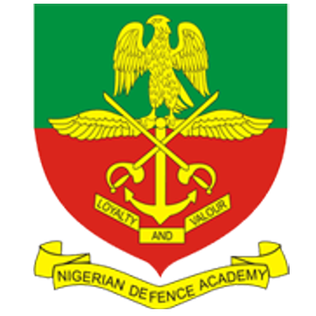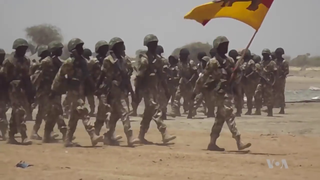Related Research Articles

The United Nations Mission in Liberia (UNMIL) was a United Nations peacekeeping operation established in September 2003 to monitor a ceasefire agreement in Liberia following the resignation of President Charles Taylor and the conclusion of the Second Liberian Civil War (1999–2003). At its peak it consisted of up to 15,000 UN military personnel and 1,115 police officers,along with civilian political advisors and aid workers.

Ọlagunsoye Oyinlọla is a retired Nigerian general,he became governor of Osun State,Nigeria in May 2003,and was reelected in 2007. He was a member of the ruling Peoples Democratic Party (PDP).

The Nigerian Defence Academy (NDA) is a military university based in Kaduna,Nigeria,that trains officer cadets for commissioning into one of the three services of the Nigerian Armed Forces:the Army,the Navy,and the Air Force. The duration of training at the Nigerian Defence Academy is five years.
Jonathan Tunde Ogbeha is a Nigerian politician and retired brigadier general who served as the administrator of Akwa Ibom State and then of Bendel State during the military rule of General Ibrahim Babangida (1985–1993). After the return to democracy in 1999,he was elected senator for the Kogi West constituency of Kogi State from May 1999 to May 2007. A biography on Ogbeha titled "Jonathan Tunde Ogbeha:A Noble Path" was written by Innocent Nzeke Waniko,a journalist,and presented publicly on 1 September 2017. The book chronicles the early life and comprehensively captures the life and career of Ogbeha.
Theophilus O Bamigboye is a retired Nigerian Colonel who served as Military Administrator of Bauchi State and then Osun State before the return to democracy in May 1999. He later entered politics,competing for governorship of Kwara State in 2007.

Mohammed Bello Kaliel was a Nigerian Army Colonel and the first Governor of Bauchi State,Nigeria after it was created on 3 February 1976 when North-Eastern State was divided into Bauchi,Borno,and Gongola states,during the military regime of General Olusegun Obasanjo. He held office until July 1978.
Colonel Ahmed Usman was a Nigerian military administrator of Ondo State and later Oyo State during the military regime of General Sani Abacha.
Brigadier General Samuel Bature Chamah was Administrator of Katsina State in Nigeria from August 1996 to August 1998 during the military regime of General Sani Abacha,and then of Kebbi State from August 1998 to May 1999 during the transitional regime of General Abdulsalami Abubakar,handing over power to the elected civilian governor Adamu Aliero on 29 May 1999.
David Medayese Jemibewon is a retired Nigerian Army major general who served as military governor of the now defunct Western State during the military regime of General Murtala Muhammed,governor of Oyo State after it had been created from part of the old Western State during the military regime of General Olusegun Obasanjo,and later as Minister of Police Affairs in the cabinet of President Olusegun Obasanjo after the return to democracy. He was a contender for the Kogi West Senatorial District in Kogi State.
Paul Ufuoma Omu was Military Governor of South-Eastern State,Nigeria between July 1975 and July 1978 during the military regimes of Generals Murtala Muhammed and Olusegun Obasanjo.

Air Commodore Abubakar Salihu was a Nigerian Air Force officer who was appointed military governor of Gongola and Adamawa States. He also served in many senior level defence military roles.
Garba Ali Mohammed was Military Administrator of Niger State in Nigeria from 1986 to December 1987 during the military regime of General Ibrahim Babangida.
Lt. Colonel Dauda Musa Komo was Administrator of Rivers State,Nigeria from December 1993 to August 1996 during the military regime of General Sani Abacha. He took office at a time of escalating violence between the Ogoni and Okrika people over crowded waterfront land,combined with Ogoni protest against Shell Oil activities and the environmental destruction of Ogoni land. He reacted aggressively,sending troops to break up demonstrations and arresting leaders of the Ogoni's MOSOP movement.
The Arewa People's Congress (APC) is a group in Northern Nigeria established to protect the interests of the people of Northern extraction. It has been described as a militant wing of the Arewa Consultative Forum. The group was formally launched on 13 December 1999. It was chaired by a retired army officer,Captain Sagir Muhammed,who had been an operative in the Directorate of Military Intelligence. The APC has a motto "to preserve the indivisibility of the country". The group said it would begin full self-defence training for northern residents in reaction to attacks on Hausas by the Oodua Peoples Congress (OPC),a Yoruba pressure group in the south.
Musa Mohammed is a Nigerian politician and Nigerian Army colonel who served as the Administrator of Yobe State,Nigeria from August 1998 to May 1999 during the transitional regime of General Abdulsalami Abubakar. Later he became the Minister of Sports and Social Development from July 2003 to July 2005 during the administration of President Olusegun Obasanjo.
Chris Abutu Garuba was Governor of Bauchi State,Nigeria from August 1985 to December 1988 during the military regime of Major General Ibrahim Babangida. He was born in Ipole,Otukpa Ogbadibo Local Government Area of Benue State.
Lawal Jafaru Isa is a retired Nigerian Army Brigadier General,and was the Military Administrator of Kaduna State from December 1993 to August 1996 during the military regime of General Sani Abacha.
Brigadier General Ibrahim Aliyu was the Military Administrator of Jigawa State from December 1993 to August 1996 during the military regime of General Sani Abacha.
Lt. Colonel Joseph Iorshagher Akaagerger was the Military Administrator of Katsina State,Nigeria from August 1998 to 29 May 1999. After the return to democracy,in April 2007 he was elected to the Senate representing Benue North East.

The 3rd Armoured Division is a division of the Nigerian Army. The division is headquartered at Jos,Plateau State.
References
- ↑ "Nigerian States". WorldStatesmen. Retrieved 2010-01-18.
- ↑ Nigeria: a viable black power : resources, potentials & challenges. Polcom Press. 1996. p. 204. ISBN 978-31594-1-0.
- ↑ "Can a Military Coup Ever Succeed Again in Nigeria?". Max Siollun. April 11, 2008. Retrieved 2009-01-18.
- ↑ "OBASANJO HIRES & FIRES". NDM DEMOCRACY WATCH 1999/03. July 1, 1999. Archived from the original on December 5, 2012. Retrieved 2009-01-18.
- ↑ Juliana Taiwo (30 June 2009). "Yar'Adua Approves Agriculture Parastatals' Boards". ThisDay. Retrieved 2010-01-18.